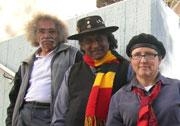What comes after sorry?
Following the Rudd Government's apology to the Stolen Generations, a landmark plan involving UNSW researchers has been revealed, detailing how to help those affected.
Following the Rudd Government's apology to the Stolen Generations, a landmark plan involving UNSW researchers has been revealed, detailing how to help those affected.

Following the Rudd Government's apology to the Stolen Generations, a landmark plan has been revealed, detailing how to best help those affected.
Compensation, programmes aimed at individual and group healing, and a special 'keeping place' - where important photos, records or other items can be safely archived - are among the urgent actions.
The strategic plan is based on four years of work by Indigenous community members and researchers at UNSW.
"The Bringing Them Home report was about acknowledging the truth of what happened, this plan is about making a change as a result," said the Kinchela Project Leader, Associate Professor Lisa Jackson Pulver, from the Muru Marri Indigenous Health Unit, in UNSW's School of Public Health and Community Medicine.
The plan focuses on those men who were sent to the Kinchela Boys' Home on the North Coast of NSW - but it is hoped that it will be used as a blueprint by other members of the Stolen Generations.
"This is the first time that the men have been given the opportunity to take control of their own futures," says Redfern pastor Ray Minniecon, who was an officer on UNSW's Kinchela Project.
"It is based on the need for justice," he says.
Mr Minniecon - who did not live at the home - travelled around NSW interviewing 34 former Kinchela boys with Cecil Bowden. Uncle Cec, now in his late 60s, spent 35 years in jail after leaving the home.
"Nearly all the boys to come out of Kinchela went straight to jail," he observes. "That's no accident. When we were in the home, a lot of the activities were about violence. We were made to bash each other."
"Monetary compensation is one part of the way you redress suffering," says Mr Minniecon. "We want to avoid litigation. We would be hoping for an ex gratia payment."
Contact details:> Associate Professor Lisa Jackson Pulver 0404 859 989; Susi Hamilton, UNSW media unit, 9385 1583 or 0422 934 024